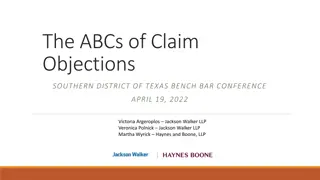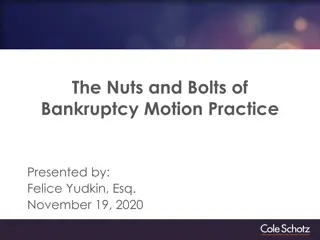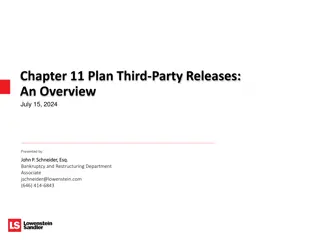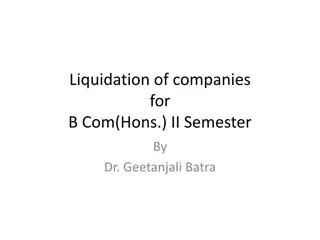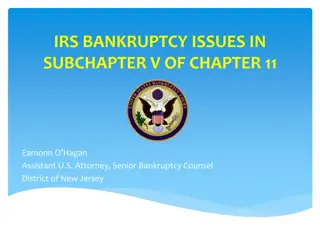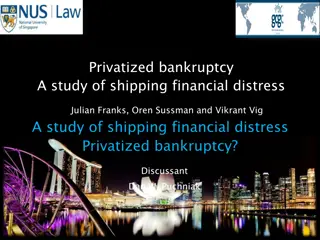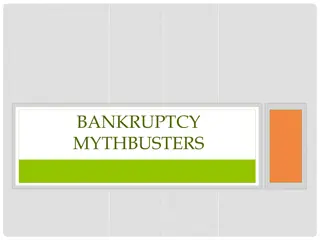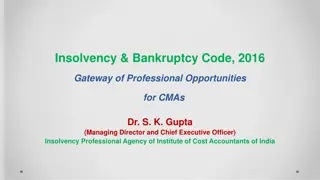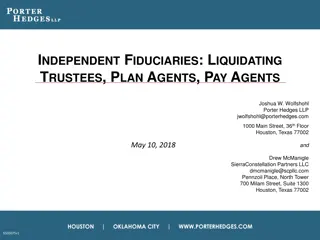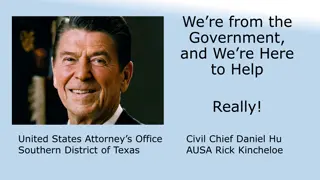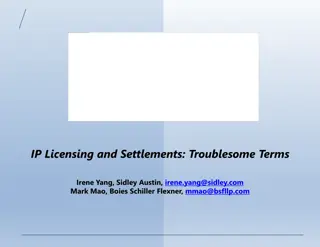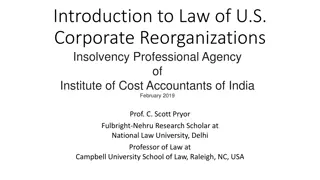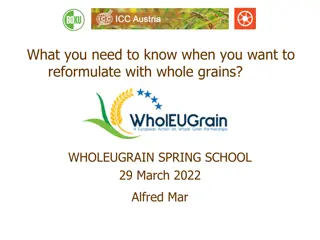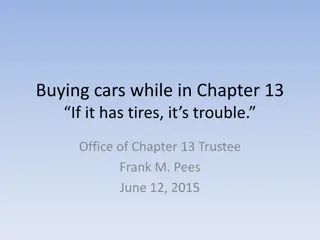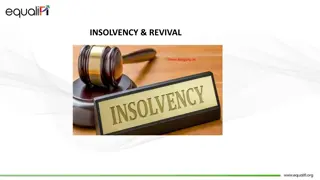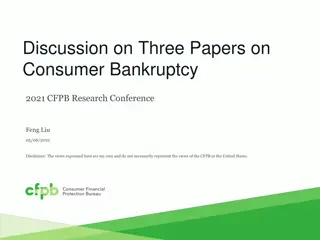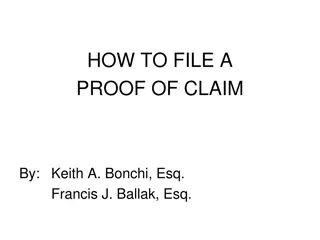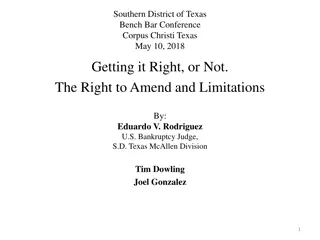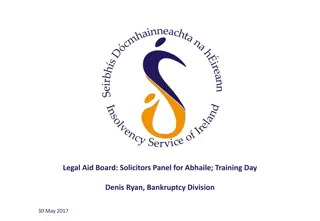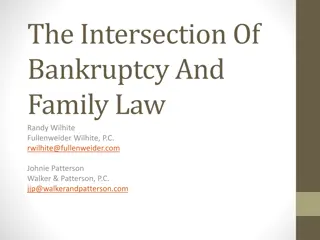Understanding Make-Whole Provisions in Chapter 11 Bankruptcy Cases
Make-whole provisions are contractual clauses allowing borrowers to repay debts before maturity, while requiring payment based on future coupon values. This article explores the purpose, definitions, and examples of make-whole provisions in bankruptcy cases, with specific references to relevant legal cases and scenarios.
Download Presentation

Please find below an Image/Link to download the presentation.
The content on the website is provided AS IS for your information and personal use only. It may not be sold, licensed, or shared on other websites without obtaining consent from the author. Download presentation by click this link. If you encounter any issues during the download, it is possible that the publisher has removed the file from their server.
E N D
Presentation Transcript
Hot Topics Affecting Creditors In Chapter 11 Bankruptcy Cases SOUTHERN DISTRICTOF TEXAS BANKRUPTCY BENCH BAR CONFERENCE MAY 10, 2018 KIM LEWINSKI DOR LAW GROUP, P.C. ARSALAN MUHAMMAD HAYNESAND BOONE, LLP CHRIS LOPEZ WEIL, GOTSHAL & MANGES LLP
T O P I C S Make Whole Premiums Make Wholes 101 Hypothetical Relevant cases Secured Financings Transfers to Unrestricted Subsidiaries M&M Lienholder Rights and Strategies In re M&G USA Corporation et al. DIP Financing/Cash Collateral Carve Outs and Professional Fees Chapter 11 Plans Valuation date Cramdown Interest Rates Gifting 2
Make Wholes 101 What are they? Definition: Make wholes are contractual provisions found in indentures that typically allow a borrower to redeem or repay notes prior to maturity, but require the borrower to pay a lump sum that is derived from a formula based on the net present value of future coupon payments that will not be paid as a result of the early repayment. Purpose: The purpose of make wholes is to determine the rights of the borrower and lender in the event the borrower determines that repaying a debt prematurely is the most economically efficient option. 3
Make Wholes 101 Examples MPM Energy Futures Ultra Petroleum the Issuer may redeem the Notes at its option, in whole at any time or in part from time to time ... at a redemption price equal to 100% of the principal amount of the [Senior Lien] Notes redeemed plus the Applicable Premium as of, and accrued and unpaid interest and Additional Interest, if any, to the applicable redemption date. [a]t any time prior to December 1, 2015, [Energy Futures] may redeem all or a part of the Notes at a redemption price equal to 100% of the principal amount of the Notes redeemed plus the Applicable Premium . . . and accrued and unpaid interest may, at its option, upon notice . . . prepay. . .one or more series or tranches of fixed rate Notes . . . at 100% of the principal amount so prepaid, plus the Make-Whole Amount determined for the prepayment date . . . . Make Whole Upon an event of default, the principal of, premium, if any, and interest on all the [Senior Lien] Notes shall ipso facto become and be immediately due and payable. all outstanding Notes . . . due and payable immediately if EFIH files a bankruptcy petition. Notes then outstanding shall automatically become immediately due and payable. In the event that any of the Notes become due under the Note Agreement, those Notes mature and the entire unpaid principal amount of such Notes, plus . . . all accrued and unpaid interest thereon . . . [and] any applicable Make-Whole Amount determined in respect of such principal amount. . . shall all be immediately due and payable . . . . Acceleration 4
In re MPM Silicones 531 B.R. 321 (S.D.N.Y. 2015) MPM issued certain Senior Lien Notes in 2010, with a maturity in 2020, & interest of 8.825% and 10% Make Whole Provision: [P]rior to October 15, 2015, the Issuer may redeem the [Senior Lien] Notes at its option, in whole at any time or in part from time to time ... at a redemption price equal to 100% of the principal amount of the [Senior Lien] Notes redeemed plus the Applicable Premium as of, and accrued and unpaid interest and Additional Interest, if any, to the applicable redemption date. (emphasis added) Acceleration Provision: Upon an event of default, the principal of, premium, if any, and interest on all the [Senior Lien] Notes shall ipso facto become and be immediately due and payable. Plan provided that: If the Senior Lien Holders voted in favor of the plan, all outstanding principal and accrued interest on the Senior Lien Notes would be paid in cash to the Senior Lien Noteholders . However, no make-whole premium would be allowed. If the Senior Lien Holders voted against the plan, they would receive replacement notes with present value equal to the allowed claim, which could include the make whole, at the court s discretion. 5 Make Wholes
Senior Lien Holders voted against the Plan Court found: The acceleration clause does not clearly and unambiguously call for the payment of the make-whole premium in the event of an acceleration of debt. The premium, if any language was not sufficient to create an unambiguous right to a make-whole payment. Courts allowing make whole payments under these circumstances have largely required the contract to provide explicitly for a make-whole premium in the event of an acceleration of debt or a default. Affirmed by the Second Circuit. In re MPM Silicones SDNY Ruling 6
Energy Futures 842 F.3d 247 (3d Cir. 2016) In 2010, Energy Futures borrowed $4 billion, at 10% with notes maturing in 2020 ( First Lien ): In 2013, Energy Futures believed that it could refinance the notes at a material discount In 2011 and 2012, Energy Futures borrowed again ( Second Lien ): Energy Futures filed bankruptcy in 2014 Provided that if there was an Optional Redemption by 2015, required payment of an Applicable Premium To avoid paying the make whole required under the First Lien and Second Lien Indentures upon a refinancing, Provided payment of Applicable Premium similar to First Lien Indenture Upon a filing of bankruptcy, all principal of and premium, if any, interest and any monetary obligations on the outstanding Notes shall be due and payable immediately. Upon a bankruptcy filing, all outstanding Notes became due and payable immediately. Stated as much in an 8-K 7 Make Wholes
Energy Futures Postpetition Bankruptcy Court First Lien Trustee filed an adversary in May 2014 seeking a declaratory judgment that the make whole was due on the First Lien. In March 2015, Energy Futures similarly refinanced a portion of the Second Lien without make whole. The Bankruptcy Court later ruled that the make whole was not payable, and the District Court affirmed regarding both the First Lien and Second Lien. 8 Make Wholes
Energy Futures Third Circuit First Lien First Lien Third Circuit focused first on the redemption language in the make whole provision of First Lien Indenture Payment of the make whole was due upon redemption, which it defined under state law to include the refinancing transaction Redemption was voluntary as the chapter 11 petitions were voluntary, and Energy Futures could have reinstated the First Lien as part of the plan Third Circuit stated that the acceleration language did not preclude payment of the make whole, and the provisions should not be read as different pathways Rather than different pathways together they form the map to guide the parties through a post-acceleration redemption. Second Lien the First Lien provisions relying on redemption requiring make whole apply, and in any event, the Second Lien Indenture language provides that upon acceleration, the make whole is due specifically premium, if any was found to include the Applicable Premium Make Wholes 9
Ultra Petroleum (Bankr. S.D. Tex. Sept. 21, 2017) Ultra issued a series of unsecured Notes, totaling approximately $1.46 billion pursuant to Note Agreement and supplements in 2008, 2009 and 2010 Make Whole provision: Ultra may, at its option, upon notice . . . prepay . . .one or more series or tranches of fixed rate Notes . . . at 100% of the principal amount so prepaid, plus the Make-Whole Amount determined for the prepayment date . . . . Make Whole Amount is defined as an amount equal to the excess, if any, of the Discounted Value of the Remaining Scheduled Payments with respect to the Called Principal of such fixed rate Note over the amount of such Called Principal . . . . Acceleration provision: all the Notes then outstanding shall automatically become immediately due and payable. In the event that any of the Notes become due under the Note Agreement, those Notes mature and the entire unpaid principal amount of such Notes, plus . . . all accrued and unpaid interest thereon . . . [and] any applicable Make-Whole Amount determined in respect of such principal amount (to the full extent permitted by applicable law) . . . shall all be immediately due and payable . . . . 10 Make Wholes
Ultra Petroleum Plan provided that unsecured claims would be paid in full, and, therefore, Noteholders were unimpaired under Section 1124(a)(1) of the Bankruptcy Code and presumed to accept the Plan Unsecured Noteholders Committee objected to confirmation on the grounds that Ultra must pay the Make Whole and the postpetition interest on the notes at default rates for the Noteholders to be unimpaired under the Plan Ultra asserted that the Make Whole should be disallowed as (1) unmatured interest not payable under Section 502(b)(2) of the Bankruptcy Code, and (2) unenforceable liquidated damages under state law; and postpetition interest should be under Federal Judgment Rate not default rate Plan confirmed on March 14, 2017 11
Ultra Petroleum Bankruptcy Make Whole + (Default Interest)? Judge Isgur found that the Make Whole was enforceable as a liquidated damages provision under New York law. Acceleration of the debt occurred on Petition Date, including the make whole. The time between the Petition Date and the payment necessitated interest payments at the default rate. 12 Make Wholes
Ultra Petroleum Bankruptcy Unimpaired? Section 502(b)(2) disallows claims for unmatured interest. Ultra proposed that the Make Whole was unmatured interest Judge Isgur stated that the extent of a discharge is governed by the terms of a confirmed plan, and the Ultra plan provided that the Noteholders claims were not impaired and shall be paid as if unimpaired under section 1124(a)(1): leaves unaltered the legal, equitable, and contractual right to which such claim or interest entitles the holder of such claim or interest Make whole amount was $201m Contractual default postpetition interest was $186m Appeals briefing is complete and there is a request from the parties for oral arguments 13 Make Wholes
Cobalt International Energy Update: Section 1124(a)(2) of the Bankruptcy Code (2) notwithstanding any contractual provision or applicable law that entitles the holder of such claim or interest to demand or receive accelerated payment of such claim or interest after the occurrence of a default (A) cures any such default that occurred before or after the commencement of the case under this title, other than a default of a kind specified in section 365(b)(2) or of a kind that section 365(b)(2) expressly does not require to be cured; (B) reinstates the maturity of such claim` or interest as such maturity existed before such default 14
Secured Financing: Unrestricted Subsidiaries Restricted Subsidiaries Unrestricted subsidiaries Unrestricted Covenants in a financing agreement generally apply to the company and its restricted subsidiaries subsidiaries are not bound by financing agreement covenants that apply to restricted groups Uses / Benefits Transfer assets outside of purview of the financing agreement s restrictive covenants Once assets are with an unrestricted subsidiary, may be used as security for new financing Incur additional debt on a standalone basis 15
Primary Challenge: Transactions between the restricted group and the unrestricted subsidiary may be subject to a transactions with affiliates covenant Secured Secured Financing: Financing: Legal Issues: Contract interpretation Fraudulent transfers Unrestricted Unrestricted Subsidiaries Subsidiaries Examples: J. Crew iHeartMedia Claire s David s Bridal Neiman Marcus 16
M&M Lienholder Rights & Strategies In re M&G USA Corporation, et al. 17
M&G filed for Chapter 11 bankruptcy on October 30, 2017 after budget was exceeded due to overrun service expenses. The Debtors sought to sell their PET plants in Corpus Christi & Apple Grove. A group of M&M Lienholders requested the Court to appoint them as a statutory committee, to which the Court denied their request. The M&M Lienholder Group opposed multiple Motions by the Debtors, including a Motion requesting all M&M Lienholders to file additional notice provisions not required under the Bankruptcy Code. Before the sale, the M&M Lienholders sought Texas court assignment of their creditor priorities, to which the Court stayed until after the Sale was completed. In the end, the M&M Lienholder group retained a reserve from the cash proceeds for later determination & distribution. In re M&G USA Corp., et al. Case No. 17-12307 Bankr. D. Del. 18
Removables vs non-removables Vendor contracts with different debtor entities M&M Lienholder Takeaways Know and watch your deadlines! The buyer gets stuck with the entire expense even if a vendor goes over its quoted budget 19
DIP Financing/Cash Collateral: Carve Out and Committee Fees Section 1129(a)(9)(A) requires that, unless otherwise agreed, each administrative claimant must receive cash equal to the allowed amount of its claim on the effective date of the plan Includes allowed professional fees of official committees incurred in investigating secured lenders liens and claims 20
DIP Financing/Cash Collateral: Carve Out and Committee Fees In re Molycorp, Inc., 562 B.R. 67 (Bankr. D. Del. 2017) Carve-out provision in a DIP financing order did not constitute a limit on the fees and expenses payable to professionals retained by a creditor s committee Court overruled objections by the DIP lender, who argued that a negotiated carve-out in the DIP order should serve as a cap on the Committee professionals compensation Court held the debtors had confirmed a plan of reorganization and thus section 1129(a)(9)(A) applied In re Cobalt International Energy, Inc., 17-36709 (Bankr. S.D. Tex.) (MI) At a January 25, 2018 cash collateral hearing, Judge Isgur stated that a cap on investigation fees in a cash collateral order was permissible But allowed creditors committee professional fees are administrative expenses that must be paid to confirm a chapter 11 plan In re Toys R Us Inc., 17-34655 (Bankr. E.D. Va.) On March 15, 2018 the debtors announced intention to wind down all U.S. operations and a proposed bifurcation of administrative claims Professional fees projected to exceed DIP budget caps 21
Chapter 11 Plan: Valuation Date Houston Sportsnet Finance, L.L.C. v. Houston Astros, L.L.C. (In re Houston Regional Sports Network, L.P.), 886 F.3d 523 (5th Cir. 2018): A bankruptcy court is not required to use either the petition date or the effective date for purposes of conducting a valuation A bankruptcy court has the flexibility to select the valuation date so long as it takes into account the purpose of the valuation and the proposed use or disposition of the collateral at issue Fifth Circuit had no issue with Judge Isgur using the petition date for valuation purposes, but remanded because [t]he Agreement must be valued in light of the Plan, without recourse to hypothetical situations which are neither proposed nor likely in this Chapter 11 cram-down 22
Chapter 11 Plan: Valuation Date HRSN involved a valuation for a chapter 11 cram down plan Does the flexible approach apply to Section 506(a) valuation in non- cram down situations? Estate retains the asset Asset a contract Asset a commodity Valuation Date Ex. HRSN Ex. Oil&Gas Estate sells the asset 23
Chapter 11 Plan: Cramdown Interest Rate In the Context of Chapter 11 Plans, There is a Split of Authority on the Process to Determine a Cramdown Interest Rate for a Dissenting Secured Creditor Class Split based on differing interpretations of the famous footnote 14 in Till v. SCS Credit Corp., 541 U.S. 465 (2004) Formula method or Efficient market test then, if none exists, Formula Method Because every cramdown loan is imposed by a court over the objection of the secured creditor, there is no free market of willing cramdown lenders. Interestingly, the same is not true in the Chapter 11 context, as numerous lenders advertise financing for Chapter 11 debtors in possession. . . Thus, when picking a cramdown rate in a Chapter 11 case, it might make sense to ask what rate an efficient market would produce. 24
Chapter 11 Plan: Cramdown Interest Rate Sixth Circuit held that cramdown rates in chapter 11 should be calculated using the formula method only where no efficient market rate exists: In re American HomePatient, Inc., 420 F.3d 559, 568 (6th Cir. 2005) In re Texas Grand Prairie Hotel Realty, L.L.C., 710 F.3d 324 (5th Cir. 2013), the Fifth Circuit affirmed a bankruptcy court confirmation order applying the formula method Fifth Circuit did not adopt two-step approach or direct use of formula method Parties agreed on application of prime-plus formula method Efficient market for financing exists in chapter 11 only if the market offers a loan with a term, size, and collateral comparable to the forced loan contemplated under the cramdown plan In re LMR, LLC, 469 B.R. 410 (Bankr. W.D. Tex. 2013), Judge Mott applied the formula method to a cramdown chapter 11 plan Recognized cases applying the two-step approach and, assuming applicable, held no efficient market 25
Chapter 11 Plan: Cramdown Interest Rate In re MPM Silicones, L.L.C., 874 F.3d 787 (2d. Cir. 2017) The Second Circuit overruled lower courts and adopted the Sixth Circuit two- step approach (i) first inquiring whether there is an efficient market and (ii) if there is no such market, applying the formula method The Second Circuit noted that the Fifth Circuit in In re Texas Grand Prairie Hotel Realty, L.L.C. held that markets for financing are efficient: If [t]hey offer a loan with a term, size and collateral comparable to the forced loan contemplated under the cramdown plan Second Circuit cites to testimony of experts arguing an efficient market may have existed for replacement notes at issue The Second Circuit remanded on issue of whether an efficient market exists 26
Chapter 11 Plan: Cramdown Interest Rate The 5TH CIRCUIT HAS NOT EXPRESSLY ADOPTED THE TWO-STEP APPROACH KEY TAKE-AWAY FOR CHAPTER 11 DEBTORS IN THE S.D. TEXAS STILL ADVISABLE TO SUBMIT EVIDENCE OF NO EFFICIENT MARKET OUT OF AN ABUNDANCE OF CAUTION 27
Chapter 11 Plan: Gifting In re Nuverra Environmental Solutions, Case No. 17-10949 (Bankr. D. Del. 2017) Chapter 11 plan separately classified 2 classes of unsecured creditors: a business and trade class an unsecured noteholder class Business and trade class received a distribution in the form of a gift from secured creditors that rendered the class unimpaired (100% recovery) Unsecured noteholders received no gift and an estimated 1% recovery on account of notes claims 28
Chapter 11 Plan: Gifting Debtors stressed difference between vertical gifting and horizontal gifting Vertical gifting: gifting to a junior class of creditors (or equity holders) Secured Creditor Gift Unsecured Creditor Junior Creditor/Equity Horizontal gifting: gifting among similarly-situated creditors of equal priority No Gift Secured Creditor Gift Noteholder Trade Creditor 29
Chapter 11 Plan: Gifting In re Nuverra Environmental Solutions, Case No. 17-10949 (Bankr. D. Del. 2017) Bankruptcy court confirmed the chapter 11 plan. Court held that the proposed gifting created a rebuttable presumption of unfair discrimination Citing factors from Bruce A. Markell, A New Perspective on Unfair Discrimination in Chapter 11, 72 Am. Bankr. L.J. 227 (1998) (the Markell Test ) Rebuttable presumption overcome because classification scheme was necessary to foster reorganization and maintain ongoing business relationships with business and trade creditors Plan did not violate the absolute priority rule because no junior creditor receiving a gift no vertical gifting Matter on appeal to the Delaware District Court WHAT DOES THIS HAVE TO DO WITH THE SOUTHERN DISTRICT OF TEXAS? 30
Chapter 11 Plan: Gifting In re Sentry Operating Co. of Texas, Inc., 264 B.R. 850 (Bankr. S.D. Tex. 2001) Judge Wesley Steen denied confirmation of chapter 11 plan Plan proposed by secured creditor/proposed purchaser of substantial debtor assets and debtors to pay a class of unsecured trade claims in full via horizontal gift Class of other unsecured creditors to receive no gift and estimated 1% recovery Court held that the proposed gifting created a rebuttable presumption of unfair discrimination citing the Markell Test Rebuttable presumption not overcome because secured creditor/plan proponent was controlled by a competitor of the debtors, and a significant portion of trade claims to be paid in full were to parties with whom [the secured lender s] parent does substantial business Can a debtor confirm a horizontal gifting plan in the S.D. Tex. without the conflict of interest issues in Sentry? 31


